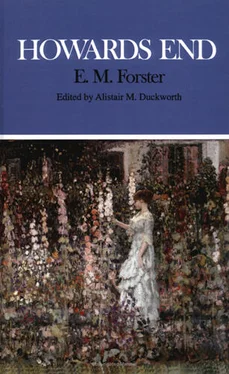Edward Morgan Forster - Howards End
Здесь есть возможность читать онлайн «Edward Morgan Forster - Howards End» весь текст электронной книги совершенно бесплатно (целиком полную версию без сокращений). В некоторых случаях можно слушать аудио, скачать через торрент в формате fb2 и присутствует краткое содержание. Жанр: Классическая проза, на английском языке. Описание произведения, (предисловие) а так же отзывы посетителей доступны на портале библиотеки ЛибКат.
- Название:Howards End
- Автор:
- Жанр:
- Год:неизвестен
- ISBN:нет данных
- Рейтинг книги:3 / 5. Голосов: 1
-
Избранное:Добавить в избранное
- Отзывы:
-
Ваша оценка:
- 60
- 1
- 2
- 3
- 4
- 5
Howards End: краткое содержание, описание и аннотация
Предлагаем к чтению аннотацию, описание, краткое содержание или предисловие (зависит от того, что написал сам автор книги «Howards End»). Если вы не нашли необходимую информацию о книге — напишите в комментариях, мы постараемся отыскать её.
Howards End — читать онлайн бесплатно полную книгу (весь текст) целиком
Ниже представлен текст книги, разбитый по страницам. Система сохранения места последней прочитанной страницы, позволяет с удобством читать онлайн бесплатно книгу «Howards End», без необходимости каждый раз заново искать на чём Вы остановились. Поставьте закладку, и сможете в любой момент перейти на страницу, на которой закончили чтение.
Интервал:
Закладка:
"It's madness when I say it, but not when you say it."
Henry shrugged his shoulders. "Margaret! Margaret!" he groaned. "No education can teach a woman logic. Now, my dear, my time is valuable. Do you want me to help you or not?"
"Not in that way."
"Answer my question. Plain question, plain answer. Do—"
Charles surprised them by interrupting. "Pater, we may as well keep Howards End out of it," he said.
"Why, Charles?"
Charles could give no reason; but Margaret felt as if, over tremendous distance, a salutation had passed between them.
"The whole house is at sixes and sevens," he said crossly. "We don't want any more mess."
"Who's 'we'?" asked his father. "My boy, pray, who's 'we'?"
"I am sure I beg your pardon," said Charles. "I appear always to be intruding."
By now Margaret wished she had never mentioned her trouble to her husband. Retreat was impossible. He was determined to push the matter to a satisfactory conclusion, and Helen faded as he talked. Her fair, flying hair and eager eyes counted for nothing, for she was ill, without rights, and any of her friends might hunt her. Sick at heart, Margaret joined in the chase. She wrote her sister a lying letter, at her husband's dictation; she said the furniture was all at Howards End, but could be seen on Monday next at 3 p.m., when a charwoman would be in attendance. It was a cold letter, and the more plausible for that. Helen would think she was offended. And on Monday next she and Henry were to lunch with Dolly, and then ambush themselves in the garden.
After they had gone, Mr. Wilcox said to his son: "I can't have this sort of behaviour, my boy. Margaret's too sweet-natured to mind, but I mind for her."
Charles made no answer.
"Is anything wrong with you, Charles, this afternoon?"
"No, pater; but you may be taking on a bigger business than you reckon."
"How?"
"Don't ask me."
Chapter 35
One speaks of the moods of spring, but the days that are her true children have only one mood; they are all full of the rising and dropping of winds, and the whistling of birds. New flowers may come out, the green embroidery of the hedges increase, but the same heaven broods overhead, soft, thick, and blue, the same figures, seen and unseen, are wandering by coppice and meadow. The morning that Margaret had spent with Miss Avery, and the afternoon she set out to entrap Helen, were the scales of a single balance. Time might never have moved, rain never have fallen, and man alone, with his schemes and ailments, was troubling Nature until he saw her through a veil of tears.
She protested no more. Whether Henry was right or wrong, he was most kind, and she knew of no other standard by which to judge him. She must trust him absolutely. As soon as he had taken up a business, his obtuseness vanished. He profited by the slightest indications, and the capture of Helen promised to be staged as deftly as the marriage of Evie.
They went down in the morning as arranged, and he discovered that their victim was actually in Hilton. On his arrival he called at all the livery-stables in the village, and had a few minutes' serious conversation with the proprietors. What he said, Margaret did not know—perhaps not the truth; but news arrived after lunch that a lady had come by the London train, and had taken a fly to Howards End.
"She was bound to drive," said Henry. "There will be her books.
"I cannot make it out," said Margaret for the hundredth time.
"Finish your coffee, dear. We must be off."
"Yes, Margaret, you know you must take plenty," said Dolly.
Margaret tried, but suddenly lifted her hand to her eyes. Dolly stole glances at her father-in-law which he did not answer. In the silence the motor came round to the door.
"You're not fit for it," he said anxiously. "Let me go alone. I know exactly what to do."
"Oh yes, I am fit," said Margaret, uncovering her face. "Only most frightfully worried. I cannot feel that Helen is really alive. Her letters and telegrams seem to have come from someone else. Her voice isn't in them. I don't believe your driver really saw her at the station. I wish I'd never mentioned it. I know that Charles is vexed. Yes, he is—" She seized Dolly's hand and kissed it. "There, Dolly will forgive me. There. Now we'll be off."
Henry had been looking at her closely. He did not like this breakdown.
"Don't you want to tidy yourself?" he asked.
"Have I time?"
"Yes, plenty."
She went to the lavatory by the front door, and as soon as the bolt slipped, Mr. Wilcox said quietly:
"Dolly, I'm going without her."
Dolly's eyes lit up with vulgar excitement. She followed him on tip-toe out to the car.
"Tell her I thought it best."
"Yes, Mr. Wilcox, I see."
"Say anything you like. All right."
The car started well, and with ordinary luck would have got away. But Porgly-woggles, who was playing in the garden, chose this moment to sit down in the middle of the path. Crane, in trying to pass him, ran one wheel over a bed of wallflowers. Dolly screamed. Margaret, hearing the noise, rushed out hatless, and was in time to jump on the footboard. She said not a single word: he was only treating her as she had treated Helen, and her rage at his dishonesty only helped to indicate what Helen would feel against them. She thought, "I deserve it: I am punished for lowering my colours." And she accepted his apologies with a calmness that astonished him.
"I still consider you are not fit for it," he kept saying.
"Perhaps I was not at lunch. But the whole thing is spread clearly before me now."
"I was meaning to act for the best."
"Just lend me your scarf, will you? This wind takes one's hair so."
"Certainly, dear girl. Are you all right now?"
"Look! My hands have stopped trembling."
"And have quite forgiven me? Then listen. Her cab should already have arrived at Howards End. (We're a little late, but no matter.) Our first move will be to send it down to wait at the farm, as, if possible, one doesn't want a scene before servants. A certain gentleman"—he pointed at Crane's back—"won't drive in, but will wait a little short of the front gate, behind the laurels. Have you still the keys of the house?"
"Yes."
"Well, they aren't wanted. Do you remember how the house stands?"
"Yes."
"If we don't find her in the porch, we can stroll round into the garden. Our object—"
Here they stopped to pick up the doctor.
"I was just saying to my wife, Mansbridge, that our main object is not to frighten Miss Schlegel. The house, as you know, is my property, so it should seem quite natural for us to be there. The trouble is evidently nervous—wouldn't you say so, Margaret?"
The doctor, a very young man, began to ask questions about Helen. Was she normal? Was there anything congenital or hereditary? Had anything occurred that was likely to alienate her from her family?
"Nothing," answered Margaret, wondering what would have happened if she had added: "Though she did resent my husband's immorality."
"She always was highly strung," pursued Henry, leaning back in the car as it shot past the church. "A tendency to spiritualism and those things, though nothing serious. Musical, literary, artistic, but I should say normal—a very charming girl."
Margaret's anger and terror increased every moment. How dare these men label her sister! What horrors lay ahead! What impertinences that shelter under the name of science! The pack was turning on Helen, to deny her human rights, and it seemed to Margaret that all Schlegels were threatened with her. "Were they normal?" What a question to ask! And it is always those who know nothing about human nature, who are bored by psychology and shocked by physiology, who ask it. However piteous her sister's state, she knew that she must be on her side. They would be mad together if the world chose to consider them so.
Читать дальшеИнтервал:
Закладка:
Похожие книги на «Howards End»
Представляем Вашему вниманию похожие книги на «Howards End» списком для выбора. Мы отобрали схожую по названию и смыслу литературу в надежде предоставить читателям больше вариантов отыскать новые, интересные, ещё непрочитанные произведения.
Обсуждение, отзывы о книге «Howards End» и просто собственные мнения читателей. Оставьте ваши комментарии, напишите, что Вы думаете о произведении, его смысле или главных героях. Укажите что конкретно понравилось, а что нет, и почему Вы так считаете.












